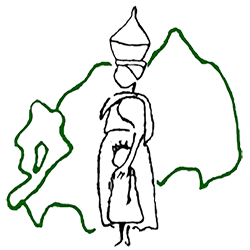Maternal health program, which was called the Malaria program till 2017, is made up of all the activities elaborated on below. The general assembly decided to combine it with other activities to include Malnutrition and child and maternal health.
It is now Maternal health ( Malaria, prenatal health, and malnutrition)
During the last few years, significant progress has been made in scaling up malaria control interventions and decreasing the number of malaria deaths. It is predicted that deaths have been decreased by over 54% and the UN optimistically predicts malaria could be eradicated in Rwanda by 2015.
RVCP has undoubtedly had an influence in the reduction of this debilitating disease. Whilst governmental initiatives tend to focus on pregnant women, who are most at risk, since 2005 RVCP has focused on a gap in the provisions, educating school children, the community and in providing Insecticide-Treated Nets (ITNs).
Despite the hard work by both governmental sources and RVCP, the battle is not won yet. The Southern Provence continues to record relatively high incidences of the disease and awareness of the causes and effects of malaria is comparatively low to other provinces.
RVCP is dedicated to continuing its work, focusing heavily on raising awareness and creating sustainable solutions to malaria.
Aims
- Reduce the morbidity rate of malaria to below 20% in the Huye district by 2014
- Reduce the morbidity rate of malaria to below 20% in the Huye district by 2014
- Raise awareness of malaria through community education sessions reaching around 60 people by December 2013.
The Project
Malaria Education Project
This year RVCP proposes to organize interactive teaching sessions in 8 primary schools. RVCP members demonstrate prepared topics on malaria transmission and prevention. It is estimated over 2000 students are reached in this scheme, working towards RVCP’s aim of raising awareness.
Malaria education also targets adults within the community. RVCP volunteers meet men and women, once a month, after community work (umuganda) and organize interactive teaching sessions. These teaching sessions typically last for one hour and cover basic information about malaria: the life cycle of vector mosquitoes, transmission of malaria, prevention methods, treatments and the role of the community in the malaria eradication process.
As a complement to malaria education, RVCP provides free or subsidized mosquito nets to 60 of the most vulnerable villagers who can not afford to buy a mosquito net. The rate of mosquito nets distribution in our target communities is one mosquito net per six people and RVCP hopes to provide further nets to those not reached by government programs
International Malaria Day Campaign
RVCP also organizes an International Malaria Day on 26th April to help raise awareness about the disease and its prevention. Three hundred people are invited to attend the event, particularly primary school children. The day centers around the students preparing and singing songs and poems about malaria as well speeches by invited guests.



